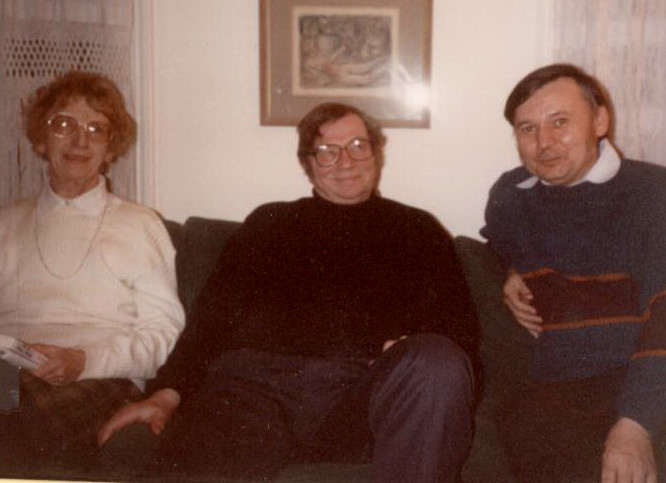My friend Damon Wilson, Colin Wilson’s son, tells me that he is writing a book, to be titled An End to Murder, that incorporates his father’s last hundred pages of original writing. It looks at why humans are so violent — and why the violent crime rate has dropped so dramatically, worldwide, in the last two decades. He said, “I’ve only written about half the book so far, but was inspired to write the final, short chapter last time I saw Dad alive. I’ve attached it, since it’s my summing-up of how I feel about my father.”
With Damon’s permission, here it is.
An End
The odds against your existence were astronomical. Your parents had to meet and then make love – the latter act at just the right time for the egg with the correct genetic mix to be available. Then the right sperm had to beat thousands of others in the race to that egg. Your mother had to carry you through pregnancy, without miscarriage, and successfully deliver you. Then you had to avoid being killed – by accident, disease or other people – up to at least this point in time.
But all that is next to nothing. Four people, your grandparents, had to go through the same destruction test to allow your parents to exist. And eight great grandparents to create your grandparents. And sixteen people in the generation before that. And thirty-two in the generation further back…
By twelve generations back from your conception – roughly 300 years – your direct forebears will have numbered 4,096 individuals. Just like you, the odds against each of those people existing, and living long enough to produce your next forebear, were incalculably high.
Now take that already inconceivable level of improbability, then add all the generations back to the first proto-human hominid that was mutated enough to branch us away from the ancestors of the chimps and bonobos. Break any part of that immeasurable chain of events, and you would never have existed. So, the odds against your existence were astronomical.
And that is true of every person that you have ever met, ever heard about, ever existed. But, of course, that is also true of every cold virus you ever suffered from, or fly you ever swatted. So add to the mix the unbelievable achievements of our species…
Surviving the great African Miocene drought, that destroyed so many other types of primate. Part-evolving into a water mammal and thus developing our strange method of walking. Using our dangerously ungainly bipedalism, and our pack instinct, to become lethal predators. Creating basic tools. Growing an increasingly powerful, but energy-expensive brain. Learning to talk. Learning to think in abstract terms. Colonising the planet. Surviving a brutal ice age, and surviving our Neanderthal cousins. And all that only takes us up to the evolution of Homo sapiens sapiens and the pre-dawn of civilisation.
Then there is the nebulous matter of human potential to consider. We may be the most selfish creatures that the planet has ever seen, but we are also the most selfless. Although individual members of other species can and often do sacrifice themselves, they do it because of undeniable instinctual drives. We are the only animal that will coolly and rationally decide to risk or sacrifice our lives for what we understand to be the greater good. Somewhere on the globe there are members of the emergency services, soldiers and just ordinary citizens who are squaring-up to that decision as you read this.
No other species is as intellectually capable as we are: both capable of creating wonders, and capable of destroying the planet. We are the only beings on Earth who seem to have the ability to feel both bitter misanthropy and generous optimism. As G.K. Chesterton noted:
“Man is an exception, whatever else he is. If he is not the image of God, then he is a disease of the dust. If it is not true that a divine being fell, then we can only say that one of the animals went entirely off its head.”
– G.K. Chesterton, All Things Considered (1908)
The premature death of anyone, seen in these terms, is a loss to the world that is beyond our understanding. The destruction of the most precious work of art is nothing compared to it. Every human-being who ever existed is irreplaceable.
George Orwell tried to express the commonplace catastrophe of that loss when he wrote about his experience – when a British Imperial Policeman in Burma – of taking a man to be hanged:
“He and we were a party of men walking together, seeing, hearing, feeling, understanding the same world; and in two minutes, with a sudden snap, one of us would be gone – one mind less, one world less.”
– George Orwell; The Hanging (1931).
My father has always been a deeply humane and optimistic person, some of which has rubbed-off onto his children. I’ve known him to be on perfectly happy conversational terms with some of the most celebrated people of the past half-century. And with brutal murderers.
When all is said and done, he has always seen people as beings of fascinating potentiality; all worthy of delighted wonder, if not always respect.
So.
Whoever you are. Whatever you’ve done. Whatever you may become.
I, and my Dad, love you.
– Damon Wilson. November 2013
